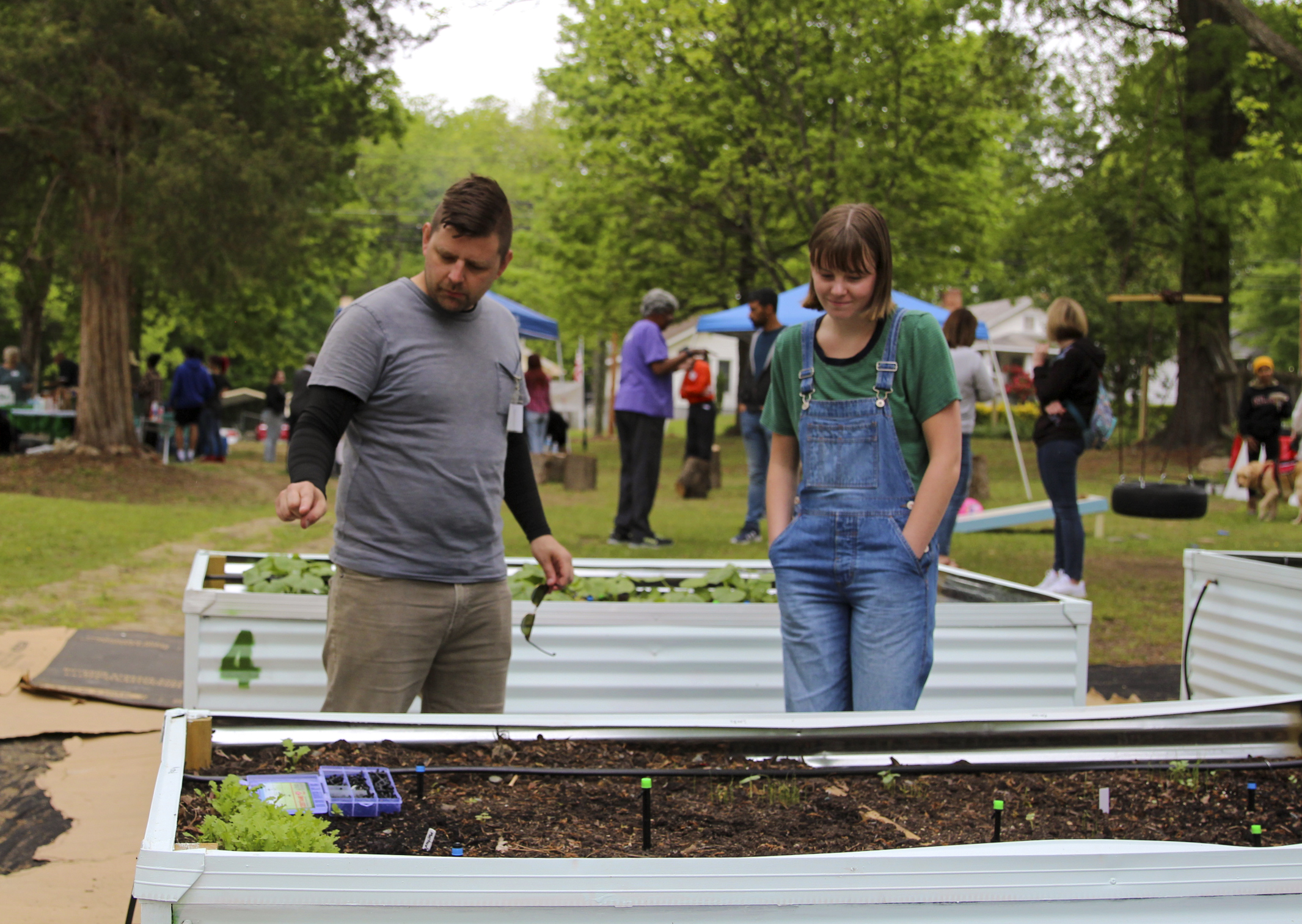Faculty and students in the Poverty and Social Justice Program collaborated with residents of Burlington's Morrowtown community to build a garden and support the emerging Burlington Community Land Trust.
The establishment of a community garden and the advancement of a community land trust this spring are among the first outcomes of a partnership between a Burlington neighborhood and Elon’s Poverty and Social Justice (PSJ) Program.
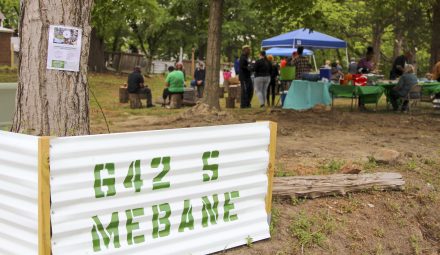 Residents of the Morrowtown community — a historically underserved area on the outskirts of Burlington’s downtown — began organizing to improve the neighborhood and staunch the blights of crime and poverty in 2018. Their work drew the attention of Toddie Peters, professor of religious studies and coordinator of the PSJ program, who began attending regular Morrowtown Community Group meetings to listen and offer potential solutions to issues identified.
Residents of the Morrowtown community — a historically underserved area on the outskirts of Burlington’s downtown — began organizing to improve the neighborhood and staunch the blights of crime and poverty in 2018. Their work drew the attention of Toddie Peters, professor of religious studies and coordinator of the PSJ program, who began attending regular Morrowtown Community Group meetings to listen and offer potential solutions to issues identified.
A community garden, playground and gathering space at 642 S. Mebane St., built by residents and students in assistant professors of philosophy Robert Leib and Lauren Guilmette’s classes, officially opened on April 30. Peters’ PSJ capstone class worked to support the newly emerging Burlington Community Land Trust. PSJ program intern, Imonni Withers ’22 also worked with a free afterschool program, Mondays in Morrowtown, at the community garden site this spring.
A community for change
The Morrowtown Community Group, a 501(c)3 nonprofit, began four years ago after Lydia Jones and Joyce Moore each lost family members to gun violence. The pair would meet with neighbors to pray and discuss solutions for youth activity, declining property values and upkeep, and crime. Jones’ home became known as a safe place for children to be, for a warm conversation or a hot meal. She calls them “my babies.” Her support for the neighborhood kids transformed into a regular Mondays at Morrowtown program.
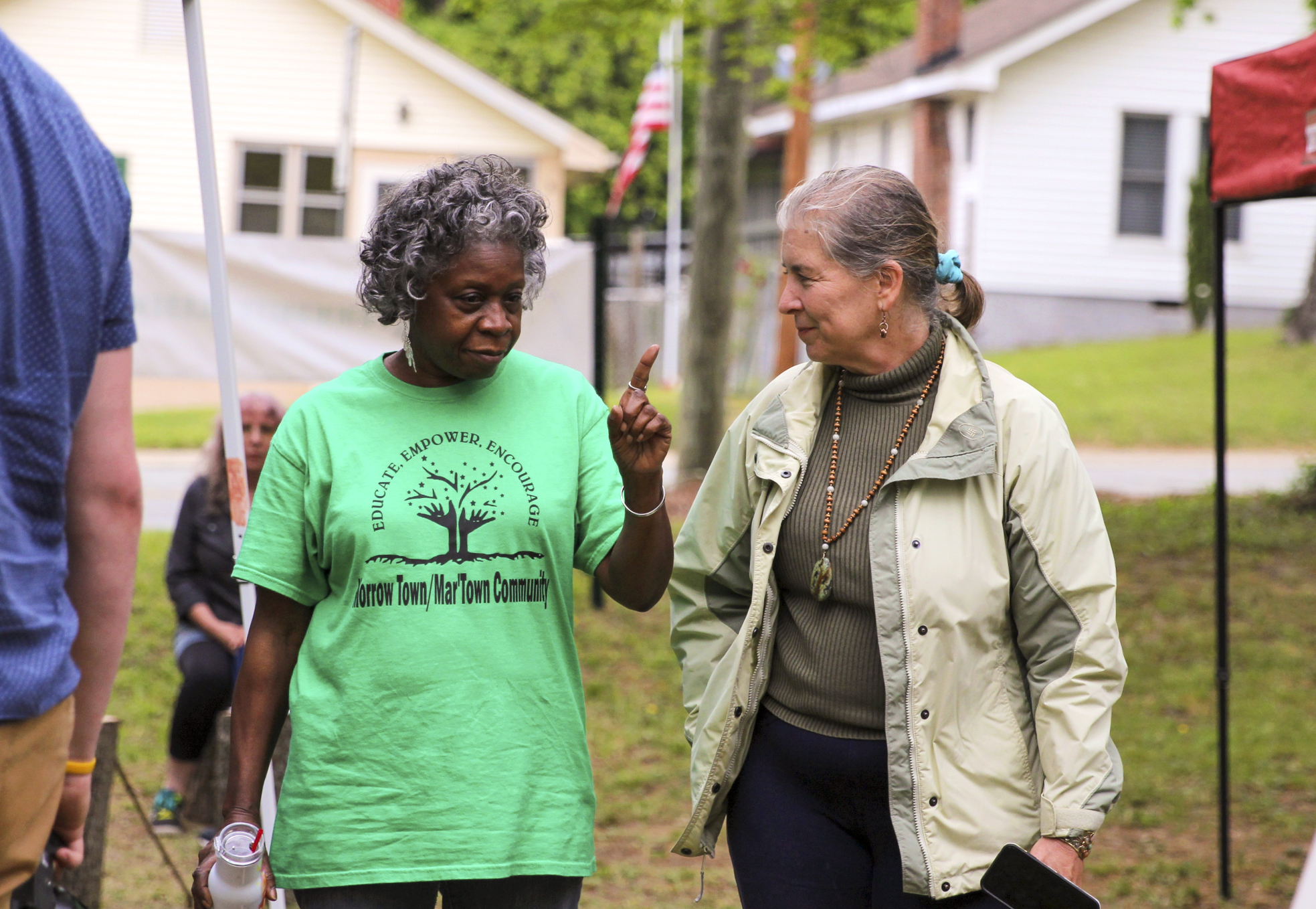
Longtime residents formed a task force, attracting the attention of the City of Burlington, churches, Alamance Citizens for a Drug-Free Community and Elon faculty. Guilmette and Leib are Morrowtown residents.
The effort to secure property for the community garden began several years ago and came to fruition last fall when community members purchased an acre of property on a corner of South Mebane Street — a heavily traveled four-lane road — and Clay Street.
“This represents something new and different in an area with a lot of poverty, crime, violence and drugs. It’s totally different,” Jones said at the garden opening. “It’s beautiful. I’m just so thankful that there are so many people who were touched by something I said.
“My babies give me strength. When I can do something to see a smile on their face, it makes me smile. It makes me feel good to know that I can do something to make a difference in their lives.”
Supporting new growth
Leib’s Poverty and Social Justice capstone students helped plan the garden last fall. Guilmette’s Health and Social Justice class organized Saturday workdays this spring to clear the property and construct the garden.
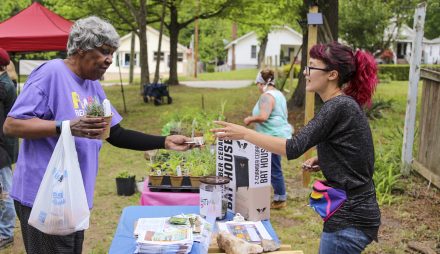
“Our mission was to start imagining what this lot could be,” Leib said. “We spent quite a bit of time drawing up layouts for the garden and how participation and membership could work. Some of that work is still ahead of us, but we’re really happy with the way this has all come together.”
The garden consists of 10 raised beds and a plot for row crops, an outdoor classroom and gathering space, compost piles, a fire pit and a small playground with rope swings and ladders. A grant from Elon’s Kernodle Center for Civic Life purchased a storage shed, which students and community members constructed earlier this spring. Area farmers have also donated fencing that will be installed later this spring.
“We started clearing in February when this was all overgrown and covered in trash,” Guilmette said. “Essentially the community members and students assembled these raised beds, hung the tire swings and the rope ladder. I have great pictures of our students rolling these 35 logs up the hill for the outdoor classroom seating.”
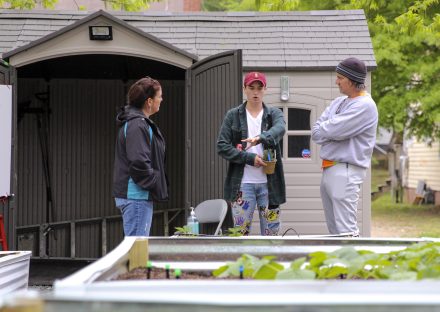
The garden should provide nutritional support in the neighborhood, which is a food desert and not within walking distance of grocery stores or farmer’s markets. It will operate on a take-as-you-need system this year, with residents able to plant and plan for crops. The system was still in the planning process as the garden’s first growing season began.
“It’s been really gratifying building it from the ground up,” said Billie Waller ’22, a philosophy major. “It was a smaller group of people when we first started, but over the course of the past couple of months, it’s been cool to see more and more people come out and get interested in it.”
Withers, an environmental studies major and PSJ minor, provided soil testing and supported the Mondays in Morrowtown afterschool program at the garden this spring as PSJ’s first intern. She planned science projects, crafts and activities for around 15 children from ages six to 16 years old.
The space has become a regular hangout for children, who flock to the tire swings in the afternoons.
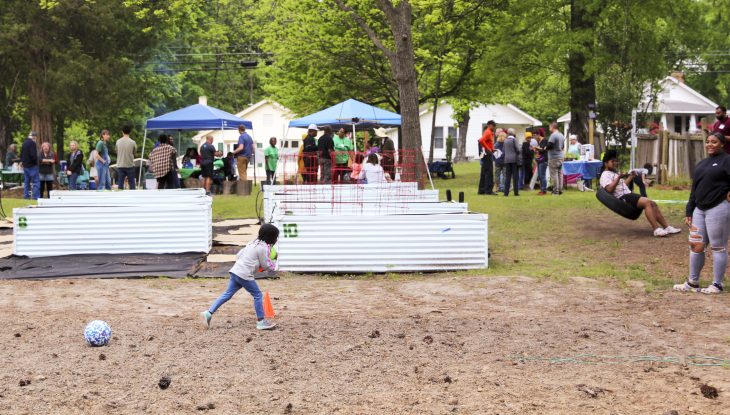
Withers grew up in an urban area rife with pollution, little access to clean air, green space or nature and poor water quality. Living in Elon improved her physical and mental health because of the better environment, she said. Her experience invested her in the program, garden, and children in Morrowtown. She is in the process of securing grant funding for a permanent Morrowtown garden internship.
“I developed a really strong connection with the children,” Withers said. “They had a huge impact on me. My internship is supposed to end in May, but I’ll be staying here at least until the end of June. These kids need someone who can be a role model and I want to be that for them.”
Creating a sustainable future
On the last day of spring semester classes, students in Peters’ PSJ capstone course presented to the Morrowtown Community Group leaders results of their work supporting the Burlington Community Land Trust in the neighborhood.
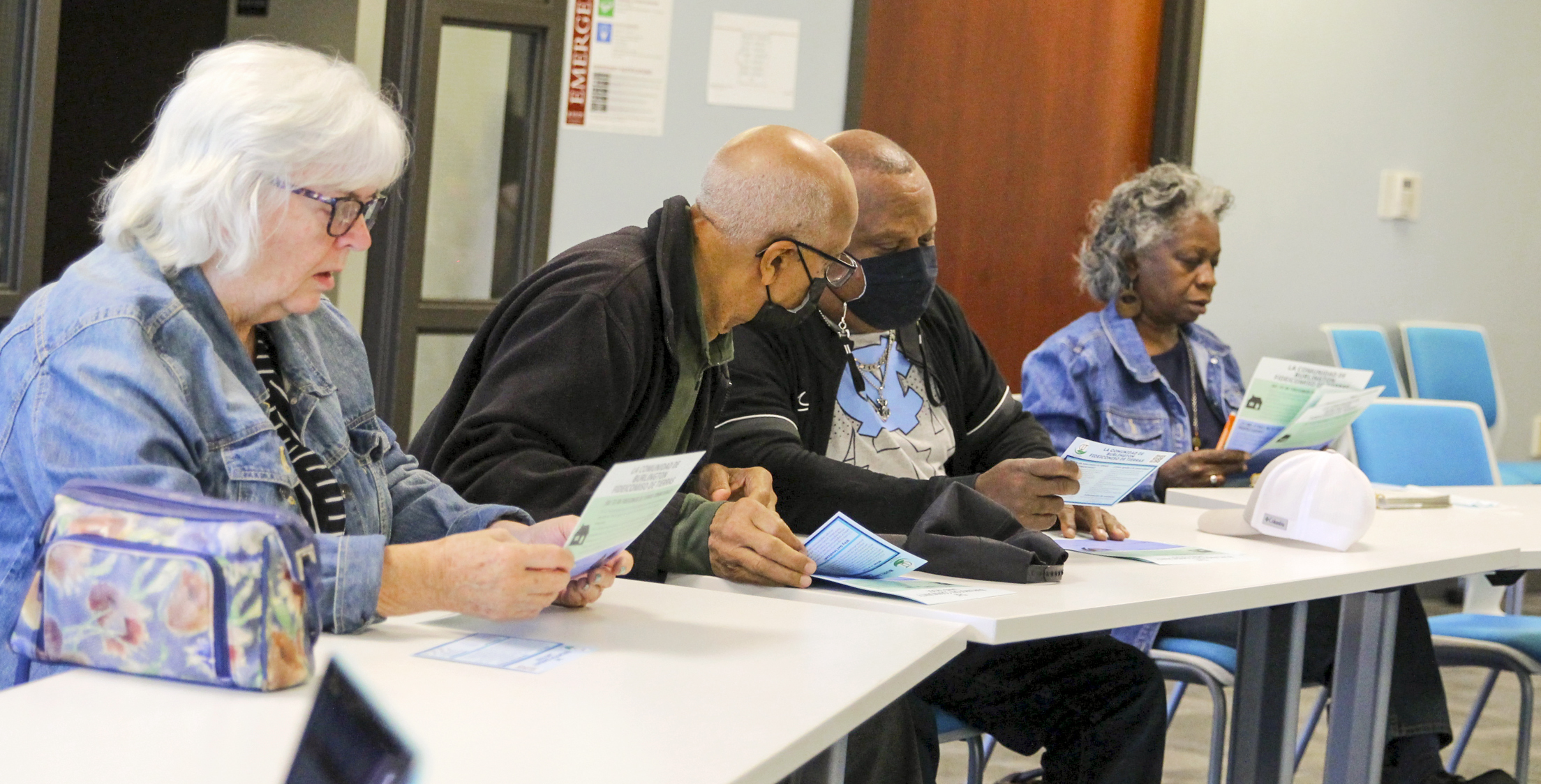
Community land trusts have become increasingly common tools for residents to ensure affordable housing and control over land use in neighborhoods. Essentially, they function to give the trust control of land while individuals own the structures on them. The land is typically leased in inheritable, 99-year increments. Property owners agree to restrictions on resell values through formulas that allow for equity building while keeping the home affordable. When properties are sold, the trust has control over how the land is used in the best interest of the community.
The land trust would increase residential ownership and reduce property rentals in the area.
Students created marketing plans for the land trust, applied for grants and began a Go Fund Me for the trust, studied trends in property ownership and values, surveyed residents and created oral history videos of Morrowtown residents. Those videos will be preserved through the Power and Place Collaborative, a partnership among Elon, the African-American Cultural, Arts and History Center and Burlington’s Mayco Bigelow Community Center to record stories of Alamance County’s Black communities.
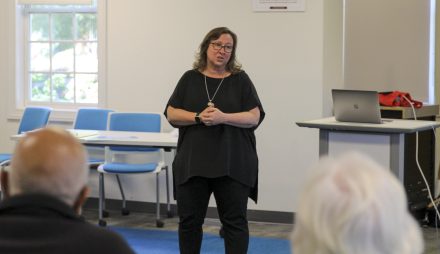
“As someone who’s a social ethicist, as someone who works with the Poverty and Social Justice Program, I really try to find meaningful ways that students at Elon and professors at Elon, and the resources of Elon can partner with people in the community in mutually beneficial ways so that … we’re listening to you and figuring out how we can use the skills and knowledge to contribute to projects and things of concern in the community,” Peters said.



